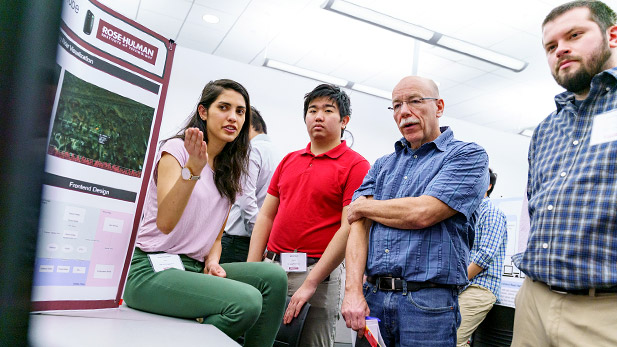Tomorrow’s Tech Brings Solutions Today in Computer Science, Software Engineering

Computer science and software engineering students demonstrate their senior-year capstone projects that were developed for an external client. A total of 16 projects were featured at the department’s Senior Projects Expo.
Alexa, what was the grade on my latest assignment?
That next step in interactive technology may soon become a reality, thanks to inventive computer programs and systems developed by creative Rose-Hulman senior computer science and software engineering students.
With the popularity of virtual assistants, the educational technology company Blackboard saw an opportunity for Amazon’s Alexa users to interface with schools and organizations across the world to gain access to such information as daily assignments, latest course grades and school announcements.
“This would be a good quality-of-life feature for any home,” says computer science major Abhimanyu (Abu) Agarwal, among five students who developed a prototype of the project.
A future project goal is to continue developing the software to make the user experience as natural as possible, much like how Alexa has been enhanced since its early days to become a staple of everyday life in many households.
Computer science student Jack Peterson says, “There’s a lot of possibilities with this project, but we have shown that this technology does work. That was Blackboard’s overall goal for us. We have proven that it is possible.”
Other forms of technology featured at this year’s Department of Computer Science and Software Engineering Senior Projects Expo featured aspects of virtual reality for the expanding simulation and gaming communities, e-learning cloud computing functions, artificial intelligence platforms, and adapting a Roku device that could control a robotic device.
Also, there were web applications that track and visualize the performance of world-class bicycle riders through GPS-compatible sensors, and help engineers make energy savings estimates for homeowners and businesses. Another application development could enhance a system that university speech, language and hearing researchers have developed to improve the communications skills for children with moderate to severe autism.
Along the way students learned new aspects of Java Script, Unity 3d game engine, machine learning and cloud computing.
Shawn Bohner, director of Rose-Hulman’s software engineering program, says, “Our students are getting real-world experiences while being challenged to work together and learn new skills to produce a prototype that shows the client that their original idea works or needs modifications and refinement.”